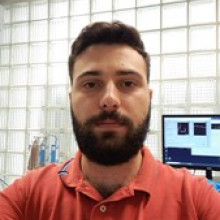Position Description
We are looking for 1 research engineer to work on the processing and characterization of polymeric pyroelectric materials. The work to be carried out is part of an EU-funded project and besides experimental work the selected engineer will be responsible for administrative work such as reporting and deliverable writing.
Required Qualifications
- BSc in Materials Science and Engineering, or Physics or Chemistry.
- MSc in Materials Science and Engineering, or Physics or Chemistry.
- Prior laboratory experience in polymer science.
- Prior knowledge and hands-on experience of basic materials characterization technics.
- Demonstrated good knowledge and use of English.
Desirable Qualifications
Good understanding of materials physics.
Application Procedure
Interested candidates who meet the aforementioned requirements are kindly asked to submit their applications, no later than July 20, 2024, 23:59 local Greece time to the address (hr@iesl.forth.gr), with cc to the Dr Eleni Pavlopoulou (epavlopoulou@iesl.forth.gr).
In order to be considered, the application must include:
- Application Form (Form Greek or Form English to the left)
- Detailed curriculum vitae (CV) of the candidate
- Scanned Copies of academic titles
Appointment Duration
12 Months with possibility of extension according to the needs of the projectPosition Description
The candidate will develop a quantum-limited atomic-optical magnetometer and characterize thequantum noise in the optical and atomic states.
Required Qualifications
- Bachelor in physics
- Graduate-levelexpertise in atomic-optical physics
- Research experience
Desirable Qualifications
Good knowledge of English
Application Procedure
Interested candidates who meet the aforementioned requirements are kindly asked to submit theirapplications to the address (hr@iesl.forth.gr), with cc to the Scientific Responsible, Dr G.Vasilakis(gvasilak@iesl.forth.gr).
In order to be considered, the application must include:
- Application Form (Form Greek or Form English to the left)
- Detailed curriculum vitae (CV) of the candidate
- Scanned Copies of academic titles
Appointment Duration
6Position Description
Ο/Η υποφήφιος/α θα αναπτύξει ένα σύστημα πηνίων που θα μας δώσει τηδυνατότητα να εφαρμόσουμε ομογενή μαγνητικάπεδία και στις τρεις κατευθύνσεις.
Required Qualifications
- Masters in physics
- Researchexperience
- Programming in Mathematica
Desirable Qualifications
- Good knowledge of English
Application Procedure
Interested candidates who meet the aforementioned requirements are kindly asked to submit theirapplications to the address (hr@iesl.forth.gr), with cc to the Scientific Responsible, Dr G.Vasilakis(gvasilak@iesl.forth.gr).
In order to be considered, the application must include:
- Application Form (Form Greek or Form English to the left)
- Detailed curriculum vitae (CV) of the candidate
- Scanned Copies of academic titles
Appointment Duration
2Position Description
A postdoctoral research associate is wanted to workin the framework of the HFRI research project"Photoenergy" to conduct experiments onsamples of marine photosynthetic membraneproteins (Lhc) using ultrafast time-resolvedabsorption laser spectroscopy to study their basicphotosynthesis and charge transfer mechanisms.
Required Qualifications
- BSc in Physical Sciences or Engineering
- MSc. in Physical Sciences or Engineering
- PhD in Physical Sciences or Engineering
- Extensive knowledge on spectroscopicmethods, instrumentation and applications(steady-state and time-resolved laserspectroscopy)
- Experience on theexperimental analysis/study of nonlinear andtransient optical properties of condensed phasenanomaterials
Application Procedure
Interested candidates who meet the aforementioned requirements are kindly asked to submit theirapplications to the address (hr@iesl.forth.gr), with cc to the Scientific Responsible, Dr P. Loukakos(loukakos@iesl.forth.gr).
In order to be considered, the application must include:
- Application Form (Form Greek or Form English to the left)
- Detailed curriculum vitae (CV) of the candidate
- Scanned Copies of academic titles
Appointment Duration
14To: 09/07/2024 14:00
The discovery of van der Waals (vdW) materials with intrinsic magnetic order in 2017 has given rise to new avenues for the study of emergent phenomena in two dimensions. In particular, monolayer CrI3 was found to be ferromagnet. Other vdW transition metal halides were later found to have different magnetic properties. How many vdW magnetic materials exist in nature? What are their properties? How do these properties change with the number of layers? A conservative estimate for the number of candidate vdW materials (including monolayers, bilayers and trilayers) exceeds ~106. A recent study showed that artificial intelligence (AI) can be harnessed to discover new vdW Heisenberg ferromagnets based on Cr2Ge2Te6 [1], [2] and vdW magnetic insulators based on MnBi2Te4 [3]. In this talk, we will harness AI to efficiently explore the large chemical space of vdW transition metal halides and to guide the discovery of magneticvdW materials with desirable spin properties. That is, we investigate crystal structures based on monolayer Cr2I6 of the form A2X6, which are studied using density functional theory (DFT) calculations and AI. Magnetic properties, such as the magnetic moment are determined. The formation energy is also calculated and used as a proxy for the chemical stability. We show that AI, combined with DFT, can provide a computationally efficient means to predict the thermodynamic and magnetic properties of vdW materials [4]. This study paves the way for the rapid discovery of chemically stable magnetic vdW materials with applications in spintronics, magnetic memory and novel quantum computing architectures.
[1] T. D. Rhone et al., “Data-driven studies of magnetic two-dimensional materials,” Sci. Rep., vol. 10, no. 1, p. 15795, 2020.
[2] Y. Xie, G. Tritsaris, O. Granas, and T. Rhone, “Data-Driven Studies of the Magnetic Anisotropy of Two-Dimensional Magnetic Materials,” J. Phys. Chem. Lett., vol. 12, no.50, pp. 12048–12054.
[3] R. Bhattarai, P. Minch, and T. D. Rhone, “Investigating magnetic van der Waals materials using data-driven approaches,” J. Mater. Chem. C, vol. 11, p. 5601, 2023.
[4] T. D. Rhone et al., “Artificial Intelligence Guided Studies of van der Waals Magnets,” Adv. Theory Simulations, vol. 6, no. 6, p. 2300019, 2023.
This research was primarily supported by the NSF CAREER, under award number DMR-2044842.


Photonics and Nanoelectronics MSc student at the Department of Physics of the University of Crete.
Interests: Semiconductors, applied physics, and devices.
Currently working on conductometric gas sensors based on nanostructured metal oxide thin layers.
Position Description
The candidate will contribute to the implementation of the project, specifically in (a) provide support to academic and industrial users, visiting IESL to carry out specific research projects in the framework of the TNA access activities of the project and (b) organizing education, training and networking activities concerning research on Materials for a Circular Economy at European level.
Required Qualifications
- PhD in Physical Sciences or Engineering
- Extensive knowledge on spectroscopic methods, instrumentation and applications (Raman, FT-IR, Fluorescence spectroscopy)
- Experience on the experimental materials analysis/study with emphasis on spectrochemical techniques
- Demonstrated experience in the implementation of R&D projects
Desirable Qualifications
- Ability and motivation to perform independent research
- Scientific publications
Application Procedure
In order to be considered, the application must include:
- Application Form (Form Greek or Form English to the left)
- Detailed CV
- Scanned copies of academic titles
Please send your application and all documents to: hr@iesl.forth.gr and cc the Scientific supervisor marked in the left column
Appointment Duration
12Position Description
Quantum Matterwaves: Detection, creation, and manipulation
Matterwaves, generated by Bose-Einstein Condensates, are the main resource in ultra-high precision atom-quantum sensors. We demonstrated the first coherent Matterwave guide (Nature 570 205--209 (2019), which will be at the core of this PhD thesis. The successful candidate will perform experiments on matterwave optics and atomic quantum transport in these waveguides. She/He will also work on sub-atom-shotnoise detection of and germination of Bose Einstein Condensates.
For the full announcement, follow the link "Related Documents"
Required Qualifications
- Master in Physics or comparable domain
- Experience in a research laboratory, ideally optics or quantum related
Desirable Qualifications
Experience in computer programming and/or mechatronics
Application Procedure
Interested candidates who meet the aforementioned requirements are kindly asked to submit their applications to the address (hr@iesl.forth.gr), with cc to the Scientific Coordinator Dr Wolf von Klitzing (wvk@iesl.forth.gr).
In order to be considered, the application must include:
- Application Form (Form Greek or Form English to the left)
- Brief CV
- Scanned copies of academic titles
Appointment Duration
12Position Description
Ο φοιτητής/τρια θα ασχοληθεί στα πλαίσια της ΕΕ3 με την εξασφάλιση της καθημερινής επιτυχούς λειτουργίας του οργάνου(SAXS) μέσω μετρήσεων σε εσωτερικό επίπεδο και με την ενσωμάτωσή του σε υπάρχουσες εθνικές και διεθνείς μεγάλες υποδομές και στα πλαίσια της ΕΕ4 θα συμμετάσχει σε ενέργειες διαφήμισης του οργάνου και των δυνατοτήτων του μέσω συμμετοχής σε συνέδρια και οργάνωσης ημερίδας/συνεδρίου
Required Qualifications
- Πτυχίο φυσικών επιστημών (φυσική, χημεία, επιστήμης υλικών) ή μηχανικού
- Προηγούμενη εμπειρία με την χρησιμοποίηση τεχνικών Ακτίνων Χ για την μελέτη υλικών με έμφαση σε πολυμερή και πολυμερικά νανοσύνθετα υλικά
- Προηγούμενη εμπειρία σε μελέτη και χαρακτηρισμό πολυμερών και υβριδικών συστημάτων και γνώση σχετικών πειραματικών τεχνικών με έμφαση στην μελέτη επιφανειακών ιδιοτήτων
- Άριστη γνώση της αγγλικής γλώσσας
Application Procedure
Στο φάκελο υποβολής της πρότασης θα πρέπει να εμπεριέχονται τα ακόλουθα:
- Αίτηση (Form Greek στην αριστερή στήλη) με αναφορά στον κωδικό της θέσης και στο όνομα του προγράμματος
- Αναλυτικό Βιογραφικό Σημείωμα
- Ευκρινή φωτοαντίγραφα τίτλων σπουδών
ΥΠΟΒΟΛΗ ΠΡΟΤΑΣΕΩΝ
Οι ενδιαφερόμενοι καλούνται να υποβάλουν τις αιτήσεις τους και όλα τα απαραίτητα δικαιολογητικά, ηλεκτρονικά στη διεύθυνση hr@iesl.forth.gr με κοινοποίηση (cc): στην Δρ. Κ. Χρυσοπούλου (kiki@iesl.forth.gr), το αργότερο μέχρι την 01η Ιουλίου 2024 και ώρα 23:59 (ώρα Ελλάδος).
Οι αιτήσεις θα πρέπει να αποσταλούν με την ένδειξη: «Αίτηση στο πλαίσιο του προγράμματος SAXS-SOFT, της πρόσκλησης εκδήλωσης ενδιαφέροντος με Α.Π. … και κωδικό θέσης … » (όπως αυτός αναφέρεται στον Πίνακα του Παραρτήματος).


